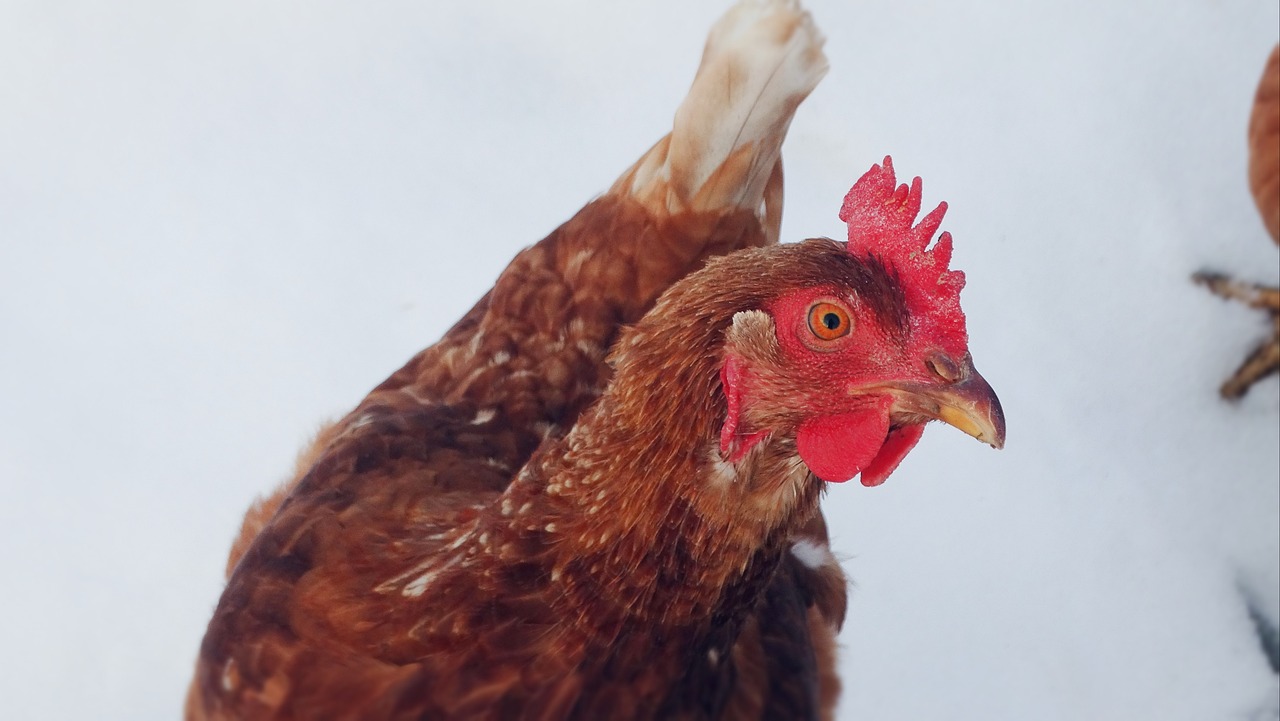As winter approaches and the temperature begins to drop, chicken keepers often wonder, “Can chickens survive winter?” Chickens are hardy birds, but they do face challenges during the cold months. However, with proper preparation and care, your feathered friends can not only survive but thrive through the winter season.
In this comprehensive article, we will explore the various aspects of winter chicken care, including their natural adaptations, housing requirements, nutrition, health considerations, and more. By the end of this article, you’ll be well-equipped to ensure your chickens stay warm, healthy, and happy during the winter months.
Understanding Chickens and Winter
Before we dive into specific winter care practices for chickens, it’s essential to understand how chickens naturally adapt to cold weather. Chickens are remarkably well-equipped to handle chilly temperatures due to their unique physiological and behavioral adaptations.
- Feathers: Chickens have a layer of feathers that provide excellent insulation. Their fluffy plumage acts as a natural barrier against the cold, trapping warm air close to their bodies. In winter, chickens grow additional downy feathers to increase their insulation.
- Roosting Behavior: Chickens are social animals, and they often huddle together on roosts at night for warmth. This communal behavior helps them conserve body heat during the coldest hours.
- Reduced Activity: During extremely cold weather, chickens may reduce their activity levels. They conserve energy by staying inside their coop, limiting their exposure to the cold.
- Increased Food Intake: Chickens tend to eat more in cold weather to generate extra body heat. Providing them with proper nutrition is crucial during the winter months.
With these natural adaptations in mind, let’s explore the steps you can take to ensure your chickens’ well-being during the winter.
Coop and Housing Considerations
The first line of defense against cold weather is your chickens’ housing. A well-constructed coop can provide a safe and comfortable environment for your birds throughout the winter.
a. Insulation: While chickens can tolerate cold temperatures, it’s important to insulate the coop to some extent. Insulation helps maintain a stable temperature inside the coop, preventing extreme fluctuations. Common insulation materials include straw bales, foam boards, or fiberglass insulation. Ensure proper ventilation to prevent moisture buildup, which can be detrimental to your chickens’ health.
b. Adequate Ventilation: Proper ventilation is crucial in preventing condensation, which can lead to damp bedding and frostbite. Ventilation should be positioned near the roof, ensuring that it doesn’t create drafts at the chicken’s roosting level. Use hardware cloth or wire mesh to cover openings to deter predators.
c. Draft-Free Design: Drafts can be harmful to chickens, so design the coop to minimize them. Seal gaps and cracks in the coop’s structure, especially around windows and doors.
d. Roosting Bars: Install roosting bars for your chickens to perch on at night. These bars should be wide enough for them to comfortably sit on without their feet touching the cold floor. This helps prevent frostbite on their toes.
e. Adequate Space: Ensure that your coop provides enough space for your chickens. Overcrowding can lead to stress and potential health problems. A general guideline is to allocate 2-3 square feet per chicken inside the coop and 8-10 square feet per chicken in an attached run.
Bedding Material
Choosing the right bedding material for your coop is essential during the winter. The bedding serves several purposes, including insulation, moisture absorption, and waste management.
a. Straw or Hay: Straw and hay are excellent bedding options for winter. They provide insulation and help absorb moisture. Replace the bedding regularly to keep it clean and dry.
b. Deep Litter Method: The deep litter method involves adding layers of bedding materials (straw, hay, or wood shavings) to the coop floor throughout the winter. As the layers accumulate, beneficial microorganisms break down waste and generate heat. This method can help maintain a warmer coop environment.
c. Sand: Some chicken keepers prefer using sand as bedding material. Sand doesn’t provide as much insulation as straw or hay but is excellent for moisture control. Ensure you scoop out wet spots regularly.
Water and Hydration
Maintaining access to clean and unfrozen water is critical for your chickens’ survival during the winter. Here are some strategies to ensure they stay hydrated:
a. Heated Waterers: Invest in heated waterers designed for cold weather. These devices prevent water from freezing, ensuring your chickens have access to liquid water at all times.
b. Frequent Checkups: Check the waterer multiple times a day to ensure it’s functioning correctly. Break ice if necessary, and refill it with warm water to help maintain a more stable coop temperature.
c. Insulate Waterers: Wrap insulation around the waterer to prevent it from freezing as quickly. Insulating materials like foam pipe wrap or foam boards can be effective.
d. Elevated Waterers: Elevate the waterer slightly to prevent bedding material from getting inside and freezing.
Nutrition and Feeding
Chickens require proper nutrition throughout the year, but their dietary needs can change during the winter.
a. High-Quality Feed: Use high-quality poultry feed that meets the specific nutritional requirements of your chickens. Consider switching to a feed with a higher protein content during the winter to help your birds generate more body heat.
b. Supplementary Foods: In addition to their regular feed, offer your chickens supplementary foods to boost their calorie intake. Scratch grains, cracked corn, and kitchen scraps (vegetables, fruits, and grains) are all suitable options. These treats can help them stay warm by generating more energy during digestion.
c. Grit: Provide your chickens with grit (small rocks or pebbles) to help them digest their food properly. Grit is especially important during the winter when chickens might be consuming more scratch grains and other supplementary foods.
d. Calcium: Continue offering a source of calcium, such as crushed oyster shells or eggshells, to support egg production and maintain strong eggshells.
e. Fresh Water: Along with their regular feed, ensure your chickens have access to clean water at all times. Hydration is essential for digestion and overall health.
Egg Production
Egg production often decreases during the winter months due to reduced daylight hours. Chickens require about 14-16 hours of light per day to maintain peak egg-laying performance. Here’s how to manage egg production during winter:
a. Supplemental Lighting: Consider adding supplemental lighting in the coop to extend the amount of daylight hours your chickens receive. Use low-wattage, energy-efficient bulbs on a timer to mimic natural daylight. This can help encourage egg production but should not be used excessively.
b. Understand Seasonal Variation: Accept that egg production may naturally decrease in winter. Chickens use their energy to stay warm rather than laying eggs.
c. Collect Eggs Frequently: Collect eggs frequently to prevent them from freezing and cracking in the nest boxes.
Cold-Weather Health Concerns
During winter, chickens are susceptible to specific health issues that can arise due to cold temperatures and confinement. It’s essential to be vigilant and take preventive measures:
a. Frostbite: Chickens can get frostbite on their combs, wattles, feet, and toes. To prevent this, ensure good ventilation in the coop to minimize moisture buildup, and consider using petroleum jelly or a commercial product to protect exposed body parts.
b. Respiratory Issues: Poor ventilation can lead to ammonia buildup from accumulated droppings, which can irritate chickens’ respiratory systems. Keep the coop clean and well-ventilated to prevent respiratory problems.
c. Dehydration: Cold weather can increase chickens’ water consumption. Ensure they have access to unfrozen water to prevent dehydration.
d. Behavioral Stress: Chickens can become stressed when confined to the coop for extended periods due to harsh weather. Provide distractions, such as hanging cabbage or other treats, to keep them engaged.
e. Predator Protection: Winter may drive hungry predators closer to your coop in search of food. Ensure your coop and run are secure to protect your chickens from potential threats.
Exercise and Entertainment
Even during the winter months, it’s important to provide opportunities for your chickens to exercise and stay mentally engaged. A lack of physical activity can lead to boredom and stress.
a. Enclosed Run: If possible, create an enclosed run that offers protection from snow, wind, and predators. This allows your chickens to stretch their legs and forage for insects and vegetation.
b. Toys and Treats: Hang chicken-friendly toys and treats, like a swinging cabbage or a treat dispenser, in the coop to keep your birds entertained and mentally stimulated.
c. Short Outdoor Breaks: On milder winter days, allow your chickens some supervised outdoor time in a protected area. Ensure they have a warm and safe place to return to when they’re ready to go back inside.
Cold-Hardy Chicken Breeds
Choosing cold-hardy chicken breeds can make winter care more manageable. Some breeds are naturally better equipped to handle cold temperatures due to their feathering and physiology. Here are a few cold-hardy chicken breeds to consider:
a. Rhode Island Red: These chickens are known for their hardiness and ability to handle cold weather.
b. Plymouth Rock: Plymouth Rocks are sturdy birds with excellent cold tolerance.
c. Wyandotte: Wyandottes have a rose comb, which is less susceptible to frostbite than single combs.
d. Orpington: Orpingtons are known for their fluffiness, which provides added insulation.
e. Australorp: Australorps are excellent layers and can withstand cold temperatures.
While these breeds are naturally better suited for winter, remember that individual chickens’ tolerance to cold can vary. Provide proper care and attention to all of your birds, regardless of their breed.
Conclusion
In answer to the question, “Can chickens survive winter?” the answer is a resounding yes. Chickens are remarkably resilient birds with natural adaptations that enable them to endure cold weather. However, it’s crucial for chicken keepers to provide the right environment, nutrition, and care during the winter months to ensure their flock’s health and well-being.
By insulating the coop, offering appropriate bedding, providing access to clean, unfrozen water, and adjusting their diet, you can help your chickens thrive in the winter. Additionally, pay attention to their health, protect them from cold-weather issues like frostbite, and make efforts to keep them mentally and physically engaged.
With proper preparation and ongoing care, your chickens can not only survive but also remain content and productive throughout the winter season, ensuring a happy and healthy flock year-round.








